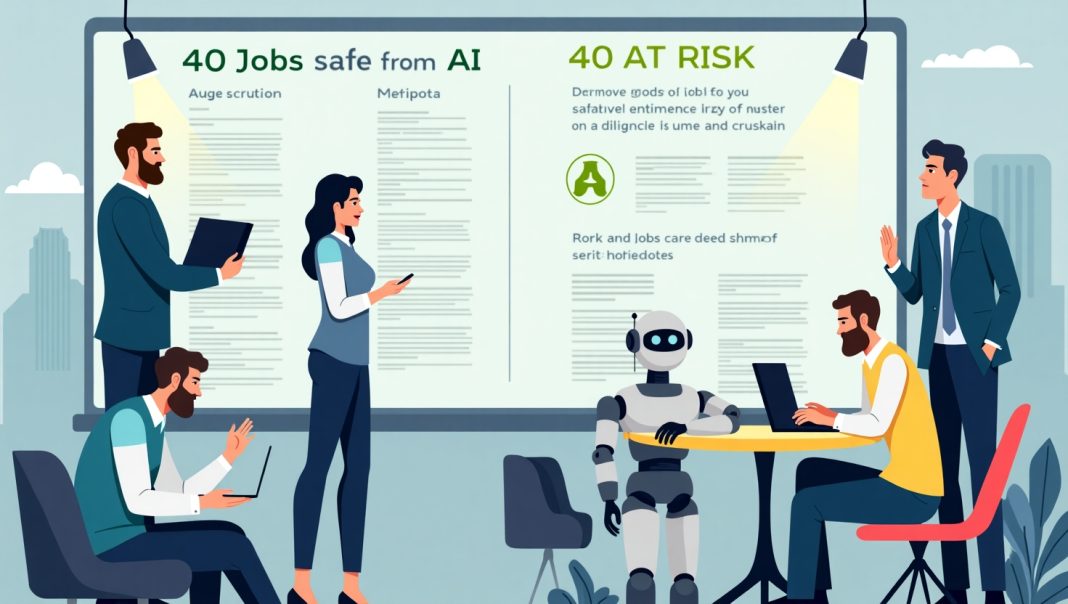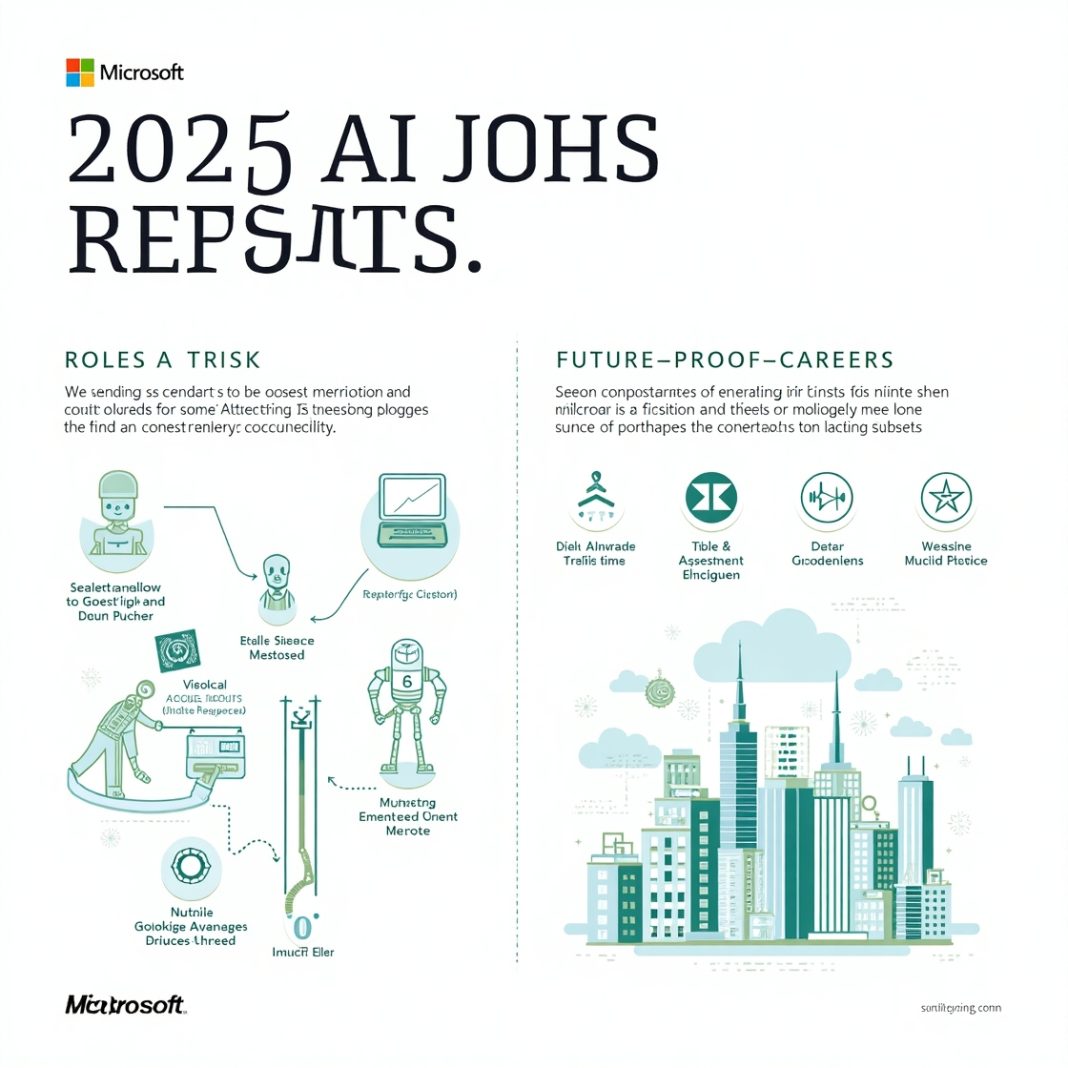Introduction: The AI Shift in the Workplace
Artificial Intelligence (AI) is changing how we live and work. By 2025, many routine jobs will be automated—but not all. Some careers remain safe. Let’s explore both sides.
Jobs AI Will Replace by 2025
AI thrives at repetitive, data-driven, and rules-based tasks. Many jobs in this category face high automation risk.
1. Administrative & Clerical Roles
- Data entry clerks
- Payroll assistants
- Receptionists
Why? AI can process documents, manage schedules, and answer routine inquiries faster and cheaper.
2. Customer Support Jobs
- Call center agents
- Online chat support
- Help desk operators
Example: Companies like banks and airlines already use AI chatbots to resolve common issues 24/7.
3. Retail & Sales Roles
- Cashiers
- Telemarketers
- Retail inventory clerks
Why? Self-checkout kiosks and AI-driven recommendation engines reduce the need for human staff.
4. Transportation & Logistics
- Taxi drivers
- Delivery drivers (short-distance)
- Warehouse pickers
Case Study: Amazon warehouses already use AI-powered robots to move, sort, and package products.
5. Finance & Accounting
- Junior accountants
- Bookkeepers
- Loan processors
Why? AI tools like QuickBooks and machine learning credit scoring reduce manual financial processing.
6. Healthcare Support Roles
- Medical transcriptionists
- Radiology assistants
- Scheduling coordinators
Example: AI can now analyze X-rays and transcribe medical notes with impressive accuracy.
7. Media & Content
- Proofreaders
- Simple news writers
- Caption generators
Why? AI writing tools can create basic reports, captions, and product descriptions in seconds.
8. Manufacturing & Production
- Assembly line workers
- Machine operators
- Quality control inspectors
Case Study: Tesla factories already deploy AI-driven robots for assembly and inspection.
40 Jobs at High Risk of Automation
- Data entry clerks
- Payroll assistants
- Receptionists
- Call center agents
- Online chat support
- Help desk operators
- Cashiers
- Telemarketers
- Retail inventory clerks
- Taxi drivers
- Delivery drivers
- Warehouse pickers
- Junior accountants
- Bookkeepers
- Loan processors
- Medical transcriptionists
- Radiology assistants
- Scheduling coordinators
- Proofreaders
- Caption writers
- Basic news reporters
- Fast food workers
- Assembly line operators
- Quality control inspectors
- Travel agents
- File clerks
- HR assistants (routine tasks)
- Paralegals (basic research)
- Bank tellers
- Ticketing agents
- Parking attendants
- Security screeners
- Insurance underwriters
- Mortgage processors
- Librarians (cataloging tasks)
- Photo editors (basic editing)
- Market research analysts (data-only roles)
- Inventory managers
- Proofing specialists
- Appointment schedulers
Jobs Safe from AI in 2025
Not all roles can be automated. Jobs requiring creativity, emotional intelligence, complex decision-making, or hands-on expertise are safer.
1. Creative & Strategic Roles
- Artists
- Writers (creative/non-formulaic)
- Marketing strategists
2. Healthcare & Human-Centered Jobs
- Doctors
- Nurses
- Therapists
Why? Empathy and human connection cannot be replaced by machines.
3. Skilled Trades
- Electricians
- Plumbers
- Carpenters
Example: Repairs in unpredictable environments require hands-on problem-solving AI can’t match.
4. Education & Training
- Teachers
- Coaches
- Mentors
5. Leadership & Management
- CEOs
- Project managers
- Policy makers
Case Study: Decision-making under uncertainty requires human judgment, negotiation, and vision.
40 Jobs Safe from AI by 2025
- Doctors
- Nurses
- Psychologists
- Social workers
- Teachers
- Coaches
- Artists
- Writers (creative)
- Editors (creative focus)
- Graphic designers
- Marketing managers
- PR specialists
- Entrepreneurs
- Business consultants
- Electricians
- Plumbers
- Carpenters
- HVAC technicians
- Event planners
- Human resource managers
- Policy makers
- Lawyers (complex cases)
- Judges
- Architects
- Engineers (innovation roles)
- Research scientists
- Chefs
- Musicians
- Actors
- Photographers (artistic focus)
- Emergency responders
- Police officers
- Firefighters
- Military officers
- Non-profit workers
- Clergy and spiritual leaders
- Journalists (investigative)
- Therapists
- Childcare providers
- Skilled negotiators
Conclusion: Adapt, Don’t Fear
AI is transforming work faster than ever. By 2025, many repetitive jobs will vanish, but countless opportunities will remain safe. The key? Adapt, reskill, and embrace change.
Related Reading
- Will AI Take Your Job? Microsoft Reveals the 40 Most Vulnerable Careers.
- From Solar to Sand: How Thermal Storage Is Changing the Energy Game.
- Are Sand Battery Systems the Key to Sustainable Power in 2025?
FAQs
Q1: Will AI take away all jobs by 2025?
No. AI will replace repetitive roles, but human creativity, empathy, and judgment remain irreplaceable.
Q2: Which industries are most affected by AI?
Finance, retail, manufacturing, and customer service are most exposed to automation.
Q3: How can workers future-proof their careers?
Focus on developing soft skills, creativity, and adaptability—areas where AI struggles.




